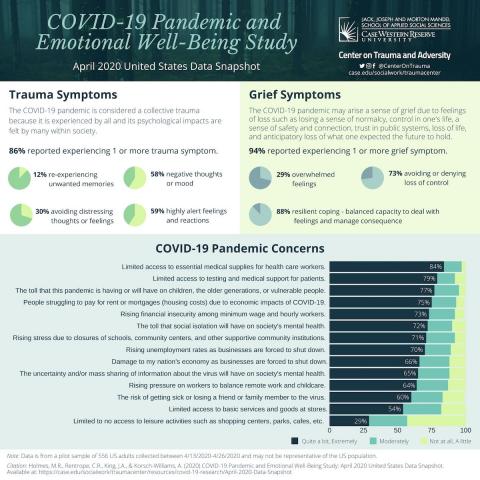Data is from a pilot sample of 556 US adults collected between 4/13/2020-4/26/2020.
Trauma Symptoms
The COVID-19 pandemic is considered a collective trauma because it is experienced by all and its psychological impacts are felt by many within society.
- 86% reported experiencing 1 or more trauma symptom.
- 12% re-experiencing unwanted memories
- 30% avoiding distressing thoughts or feelings
- 58% negative thoughts or mood
- 59% highly alert feelings and reactions
Grief Symptoms
The COVID-19 pandemic may arise a sense of grief due to feelings of loss such as losing a sense of normalcy, control in one's life, a sense of safety and connection, trust in public systems, loss of life, and anticipatory loss of what one expected the future to hold.
- 94% reported experiencing 1 or more grief symptom.
- 29% overwhelmed feelings
- 73% avoiding or denying loss of control
- 88% resilient coping - balanced capacity to deal with feelings and manage consequence
COVID-19 Pandemic Concerns
Participants who reported Quite a bit or extremely:
- 84% Limited access to essential medical supplies for health care workers.
- 79% Limited access to testing and medical support for patients.
- 77% The toll that this pandemic is having or will have on children, the older generations, or vulnerable people.
- 75% People struggling to pay for rent or mortgages (housing costs) due to economic impacts of COVID-19.
- 73% Rising financial insecurity among minimum wage and hourly workers.
- 72% The toll that social isolation will have on society's mental health.
- 71% Rising pressure/stress due to closures of schools, community centers, and other supportive community institutions.
- 70% Rising unemployment rates as businesses are forced to shut down.
- 66%Damage to my nation's economy as businesses are forced to shut down.
- 65% The toll that the uncertainty and/or mass sharing of information about the virus will have on society's mental health.
- 64% Rising pressure on workers to balance remote work and childcare.
- 60% The risk of getting sick or losing a friend or family member to the virus.
- 54% Limited access to basic services and goods at stores.
- 29% Limited to no access to leisure activities such as shopping centers, parks, cafes.
Note: Data may not be representative sample.
Citation: Holmes, M.R., Rentrope, C.R., King, J.A., & Korsch-Williams, A. (2020) COVID-19 Pandemic and Emotional Well-Being Study: April 2020 United States Data Snapshot. Available at: https://case.edu/socialwork/traumacenter/resources/covid-19-research/april-2020-data-snapshot


